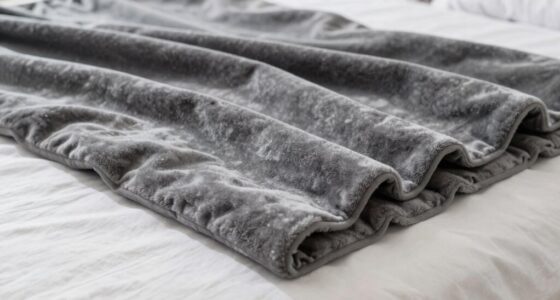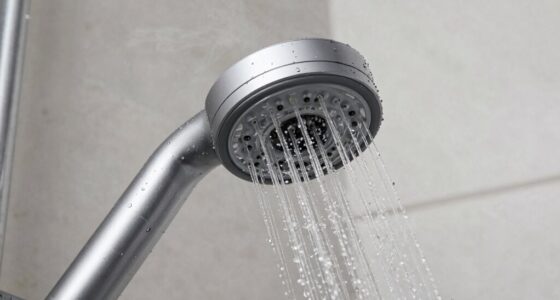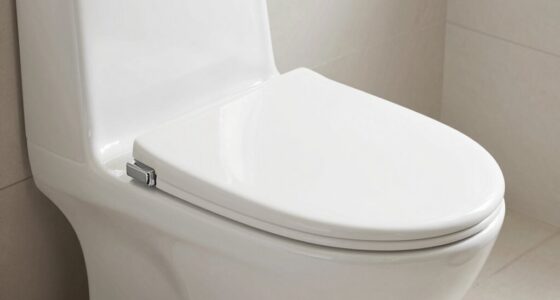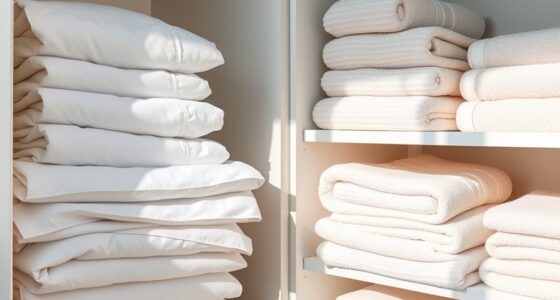Hard water in your bathroom causes stubborn spots, soap scum buildup, and dull surfaces that make cleaning frustrating. The minerals like calcium and magnesium in hard water leave deposits on fixtures, glass, and tiles, creating unsightly streaks and dullness. To fix this, you can install a water softener, regularly clean with vinegar, or use specialized soaps formulated for mineral-rich water. Keep exploring solutions to keep your bathroom sparkling and free from persistent buildup.
Key Takeaways
- Hard water causes mineral deposits and soap scum, leading to spots and dull bathroom surfaces.
- Installing a water softener or using descaling agents can effectively reduce mineral buildup.
- Regularly wiping surfaces with vinegar or commercial cleaners prevents stubborn deposits.
- Using soaps formulated for hard water reduces soap scum formation and improves cleaning effectiveness.
- Maintenance strategies like squeegeeing after showers and routine cleaning keep surfaces free of spots and buildup.
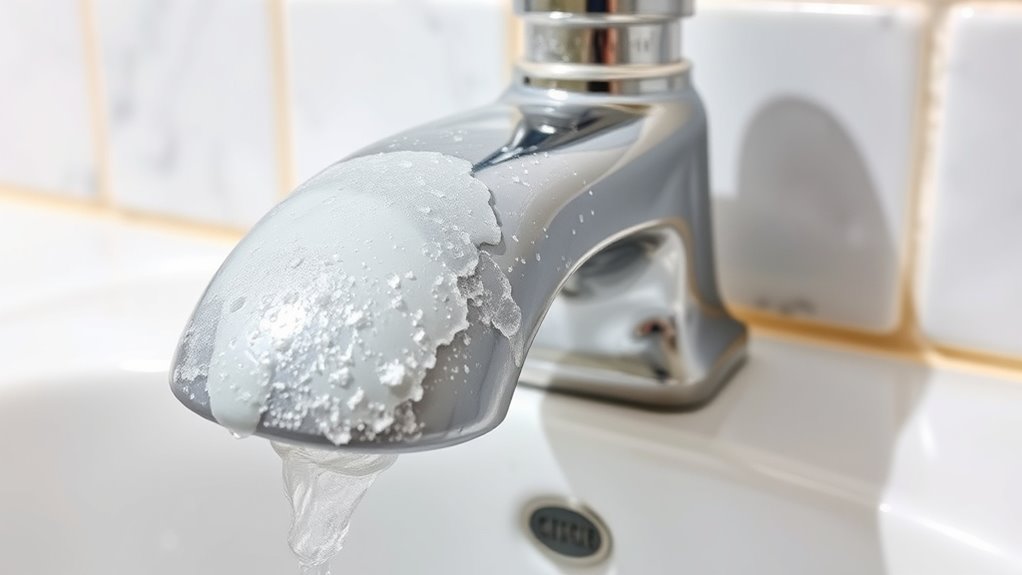
Hard water is a common issue in many bathrooms, and it occurs when minerals like calcium and magnesium are present in high concentrations. These minerals are dissolved in your water supply, and when the water evaporates or dries, they leave behind unsightly spots and buildup. You might notice white or grayish streaks on your glass shower doors, fixtures, or tiles. Over time, this mineral residue can become stubborn, making your bathroom look dull and unclean. It’s frustrating to scrub repeatedly without fully removing these deposits, but understanding the cause helps you tackle the problem more effectively.
Hard water causes mineral spots and buildup that dull bathroom surfaces.
As you use soap or body wash, you may also notice soap scum forming on surfaces. Soap scum isn’t just a cosmetic issue; it’s a combination of soap, minerals, and dirt that sticks to surfaces, especially in areas with hard water. When soap reacts with calcium and magnesium, it creates insoluble compounds that cling stubbornly to your bathtub, sink, or shower walls. This buildup not only looks unsightly but can also trap grime and bacteria, leading to a less hygienic environment. You might find yourself scrubbing more often, but without the right solutions, soap scum keeps coming back, diminishing the sparkle of your bathroom fixtures.
Fortunately, you have options to combat these issues. One of the simplest and most effective solutions is installing a water softener. This device exchanges calcium and magnesium ions with sodium or potassium, reducing the mineral content that causes hard water problems. Softened water prevents mineral deposits from forming on surfaces, making cleaning easier and more effective. If installing a softener isn’t feasible, you can use specialized descaling agents or vinegar-based solutions to break down mineral buildup. Regularly wiping down surfaces with a mixture of vinegar and water prevents deposits from accumulating and keeps your bathroom looking fresh.
Another tip is to switch to soap that’s formulated for hard water. These soaps are designed to work better in mineral-rich water, producing less soap scum and rinsing away more easily. Using a squeegee after showers also helps remove excess water and minerals before they dry and settle on surfaces. Consistent maintenance, like cleaning with vinegar or commercial descaling products, will keep buildup at bay and preserve the shine of your fixtures. Additionally, choosing filtration systems like HEPA or activated carbon filters can improve overall water quality and reduce mineral content to some extent.
In the end, managing hard water in your bathroom requires a combination of preventative measures and regular cleaning. By understanding how minerals affect your surfaces and choosing the right tools and products, you can reduce spots and soap scum, making your bathroom a cleaner, more inviting space.
Frequently Asked Questions
Can Hard Water Damage Bathroom Fixtures Over Time?
Yes, hard water can damage your bathroom fixtures over time. The mineral deposits, mainly calcium and magnesium, build up on surfaces like faucets, showerheads, and tiles. This buildup can cause corrosion, reduce water flow, and lead to staining or pitting. To prevent damage, you should regularly clean your fixtures, use water softeners, or install filters. These steps help extend the lifespan of your bathroom fixtures and keep them looking their best.
Are There Natural Remedies for Hard Water Stains?
Yes, you can fight hard water stains naturally. Imagine turning your bathroom into a fresh spring with everyday ingredients; lemon juice acts like a bright, natural bleach that dissolves mineral deposits, while vinegar is a gentle scrub brush that breaks down soap scum and limescale. Mix them into a spray, and watch stubborn stains vanish like magic. These remedies are eco-friendly, affordable, and safe for your fixtures.
How Often Should I Test My Water Hardness?
You should test your water hardness at least once a year to stay on top of any changes. If you notice more spots, soap scum, or mineral buildup, consider testing more frequently, like every six months. Regular testing helps you determine if you need to adjust your water treatment system or use specific cleaners. Keep track of your results to prevent hard water issues from becoming more severe over time.
Do Water Softeners Harm Plumbing Systems?
Water softeners generally don’t harm your plumbing systems when properly maintained. In fact, they can help prevent mineral buildup that causes pipes to clog or corrode. However, if the system isn’t maintained, salt or resin can cause blockages or leaks. Regular inspections and maintenance ensure your water softener functions efficiently, protecting your plumbing and extending its lifespan. Properly cared for, a water softener is safe for your entire plumbing system.
Can Hard Water Affect Skin and Hair Health?
Yes, hard water can affect your skin and hair health. It strips away natural oils, leaving your skin feeling dry, itchy, and prone to irritation. For your hair, it can cause dryness, dullness, and make it harder to manage. You might notice increased scalp irritation or hair breakage. To minimize these effects, consider installing a water softener or using gentle, hydrating skincare and hair care products designed for hard water conditions.
Conclusion
Dealing with hard water spots and soap scum might seem overwhelming at first, but with these simple solutions, you can keep your bathroom sparkling. Imagine your sink and shower shining without those stubborn marks, making your space feel fresh and clean. Don’t let hard water frustration hold you back—try a vinegar rinse or install a water softener. You’ll see the difference quickly, turning your bathroom into a pristine oasis.


